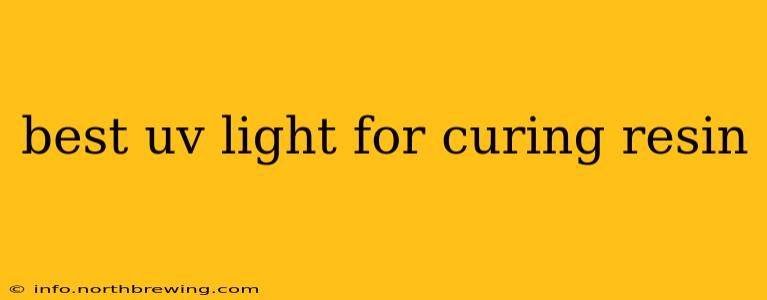Choosing the right UV light for curing resin can significantly impact the final product's quality and durability. Whether you're a seasoned artist working with intricate resin jewelry or a beginner crafting simple resin coasters, understanding the nuances of UV curing lights is crucial. This guide will help you navigate the options and find the best UV light for your specific needs.
What are the Different Types of UV Lights for Resin Curing?
Several types of UV lights are available for curing resin, each with its strengths and weaknesses:
-
UV LED Lights: These lights are known for their energy efficiency, long lifespan, and instant on/off capabilities. They offer precise control over the curing process, making them ideal for intricate projects. The wavelength emitted is typically in the range of 365nm, which is effective for most resin formulations.
-
UV Fluorescent Lights (UV-A): While less common now due to the rise of LED technology, UV fluorescent lights are still available and relatively affordable. They're generally less powerful and efficient than LEDs, requiring longer curing times. They also produce heat, which can negatively affect some resins.
-
UV Nail Lamps: While these are readily available and inexpensive, they often have lower power output compared to dedicated resin curing lights. This can result in incomplete curing, leading to a sticky or weak final product. They're typically suitable only for small, thin resin projects.
What Wavelength of UV Light is Best for Curing Resin?
The optimal wavelength for curing resin is typically 365nm (UV-A). While some resins might react to other wavelengths, 365nm is the most common and widely effective wavelength. Always check the manufacturer's instructions for your specific resin to confirm the recommended wavelength.
How Much Power (Watts) Do I Need in a UV Light for Resin Curing?
The wattage of the UV light is directly related to its curing speed and power. Higher wattage usually translates to faster curing. However, excessively high wattage can generate excessive heat, leading to bubbles or warping in the resin. A good balance is key. For small projects, a lower wattage (e.g., 9W-12W) might suffice. For larger or thicker pieces, a higher wattage (e.g., 36W or more) is recommended.
What are the Key Features to Look For When Buying a UV Light for Resin?
Beyond wattage and wavelength, consider these essential features:
-
Timer: A built-in timer allows for precise control over the curing time, preventing over-curing or under-curing.
-
Adjustable Intensity: Some lights allow you to adjust the intensity of the UV light, providing more control over the curing process.
-
Size and Shape: Choose a light that is appropriately sized for your projects. Larger lights are better for curing larger pieces, while smaller lights are suitable for smaller, intricate works.
-
Durability: Look for a well-constructed light with a durable casing that can withstand regular use.
How Long Does it Take to Cure Resin with a UV Light?
Curing time depends on several factors, including the type and thickness of the resin, the wattage of the UV light, and the distance between the light and the resin. Always follow the manufacturer’s recommendations for your specific resin. Generally, expect curing times from a few seconds to several minutes.
What are some common mistakes to avoid when curing resin with UV light?
-
Insufficient curing time: This leads to a sticky or weak final product.
-
Over-curing: Excessive exposure to UV light can cause yellowing or other unwanted effects.
-
Incorrect distance: Keeping the resin too far from the light will lengthen curing time, while placing it too close can cause overheating.
-
Using the wrong type of UV light: Not all UV lights are created equal, and using an unsuitable light can result in poor curing.
Choosing the best UV light for curing resin requires careful consideration of your specific needs and the resin you're using. By understanding the factors discussed above, you can ensure your resin projects are cured perfectly, resulting in beautiful, durable, and professional-looking results.
